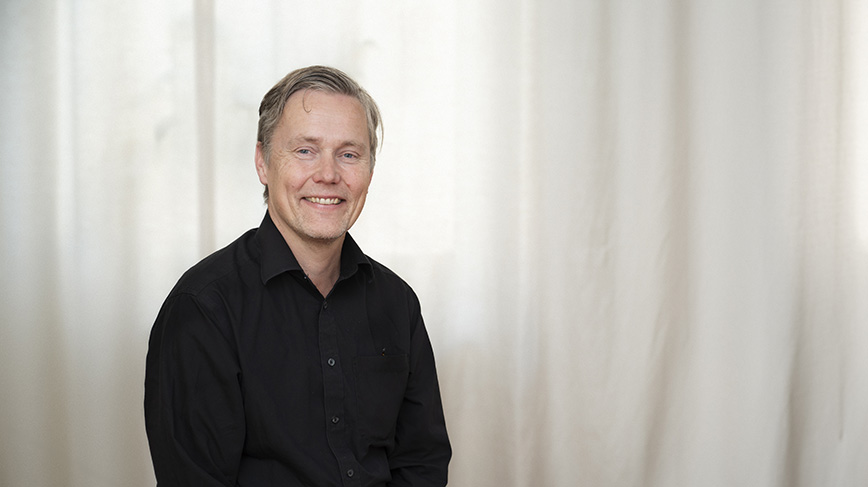"An enormous potential - but AI is not always right"

AI and humans in focus
Security and truthfulness are some of the challenges in using AI.
"AI is an incredibly powerful tool and we need to see how we can interact with AI to build a society that benefits us humans," says Karl Henrik Johansson, Professor of Network Regulation, adding:
"But it's not a superpower that's always right - no Professor Balthazar."
Throughout his teaching and research career, Karl Henrik Johansson has walked side by side with AI in various forms, and has seen AI grow both at KTH and in the everyday lives of people around the world. Control engineering, systems engineering, autonomous systems such as self-driving cars, and robots that interact with humans and each other are some of the things he has researched and worked on.
He is also the director of Digital Futures, a research environment with over a hundred research projects and several hundred research groups. With an interdisciplinary and collaborative approach, they work on different aspects of digitalisation to address the challenges and changes society is facing.
All areas
Energy, transport, health, urban planning are some of the areas where KTH's researchers use AI - pretty much all areas where people are, live and move.
"We have a great breadth and tradition in the field, and we are far ahead."
Karl Henrik Johansson cites the development of the car as an example of how fast development has been and continues to be.
"30 years ago the car was a car, now it's a car on the outside but inside it's more like an iPad with AI technology built into every part to interact with the driver. "
He takes a different perspective, where the car itself is more a component of a transport system that is controlled from elsewhere using AI.
"This immediately raises a number of ethical dilemmas based on cultural and safety issues. When the technology is safe enough, should a five-year-old be able to get a driving licence? Can AI predict lightning strikes? he asks rhetorically, noting in passing:
"Humans have mastered the art of adapting to their environment, something machines are generally bad at."
Recognising patterns
The potential of AI for the development of society is enormous - not least in terms of human life, says Karl Henrik Johansson. More efficient energy solutions, smarter cities, more sustainable transport, health-promoting solutions - the list is endless, both in terms of system solutions and on an individual level.
"We have an abundance of data. The hard part is not collecting the data, but recognising the patterns and getting machines to make reliable decisions based on them,"Johansson says.
A common example of so-called generative AI is chatGPT, which more and more people are using at work and play, regardless of industry.
AI does all sorts of sorting for us. But how do we know that what ChatGPT, for example, answers is true?
"Nothing really. But what we are researching now is how we can guarantee that the results are correct and generate safe solutions. "
Karl Henrik Johansson uses ChatGPT himself for domestic purposes - perhaps especially when he is writing a letter and needs some inspiration for wording. He is often struck by how Americanised the letter can be, because most of the language model is trained on American text.
When ChatGPT generates new text to train on, does it not cultivate a uniform language and perhaps even a uniform way of thinking in the long run? We will become more one-sided and stupid?
"Exactly! This phenomenon was described and mathematically explained in an article in Nature this summer, so there are many aspects of AI that we need to understand better and more fundamentally. After all, we are the ones driving the development and ensuring that it is used wisely, always thinking one step ahead with a critical eye."
What will AI look like in ten years' time?
"Well, that's impossible to answer, of course, but it will change KTH's research and education. AI is disruptive to society in many ways - but it's our job to make sure we use it to do things better and for the right purposes."
Karl Henrik Johansson suggests that in a possible future interview, the three of us could be in the conversation - as a way of keeping creativity alive as well.
"Yes, or when our students or, for that matter, researchers need to solve something - then a robot assistant can be involved," he says.
Footnote: The story of Professor Balthazar was an animated TV series from the 1960s. The Professor solves any problem with the help of his universal machine. He invented a flying washing machine, among other things.
Article in Nature Shumailov, I., Shumaylov, Z., Zhao, Y. et al. AI models collapse when trained on recursively generated data. Nature 631, 755-759 (2024).
Text: Jill Klackenberg
Photo: Theresia Köhlin
